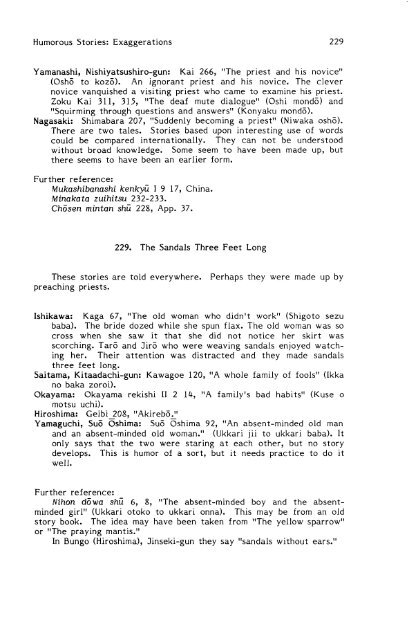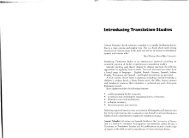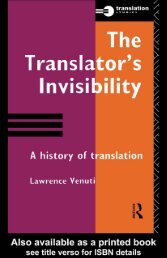- Page 1 and 2:
The Yanagita Kunio Guide to the Jap
- Page 4 and 5:
The Yanagita Kunio Guide to the Jap
- Page 6 and 7:
Contents Preface Translator's Notes
- Page 8 and 9:
Preface This work of Yanagi ta Kuni
- Page 10 and 11:
Preface ix 1)5 became the standard
- Page 12 and 13:
Preface sUbtopics which he felt fit
- Page 14 and 15:
Preface xiii 8. Fanny Hagin Mayer,
- Page 16 and 17:
Translator's Notes xv because of th
- Page 18 and 19:
Acknowledgements A translation and
- Page 20 and 21:
About Folk Tales by Yanagita Kunio
- Page 22 and 23:
Yanagita Kunio xxi number to 100 we
- Page 24 and 25:
Yanagita Kunio xxiii ning. The fact
- Page 27 and 28:
xxvi About Folk Tales 11. lenkoku m
- Page 30 and 31:
1. Propitious Births 1. Momotaro On
- Page 32 and 33:
Propitious Births 5 2. Rikitaro A s
- Page 34 and 35:
Propi tious Births 7 Fukushima, Iwa
- Page 36 and 37:
Propi tious Births 9 Further refere
- Page 38 and 39:
Propi tious Births 11 tego). Both s
- Page 40 and 41:
Propitious Births Yearsley 218. A s
- Page 42:
Lives of Unusual Children 15 growth
- Page 45 and 46:
3. Unpromising Marriages that Becam
- Page 47 and 48:
20 The Yanagita Guide to The Japane
- Page 49 and 50:
22 The Yanagita Guide to The Japane
- Page 51 and 52:
24 The Yanagita Guide to The Japane
- Page 53 and 54:
26 The Yanagita Guide to The Japane
- Page 55 and 56:
28 The Yanagita Guide to The Japane
- Page 57 and 58:
30 The Yanagita Guide to The Japane
- Page 59 and 60:
32 The Yanagita Guide to The Japane
- Page 61 and 62:
34 The Yanagita Guide to The Japane
- Page 63 and 64:
36 The Yanagita Guide to The Japane
- Page 65 and 66:
38 The Yanagita Guide to The Japane
- Page 67 and 68:
40 The Yanagita Guide to The Japane
- Page 69 and 70:
42 The Yanagita Guide to The Japane
- Page 71 and 72:
4. Stepchildren Stories 34. Nukabuk
- Page 73 and 74:
4-6 The Yanagita Guide to the Japan
- Page 75 and 76:
48 The Yanagita Guide to the Japane
- Page 77 and 78:
50 The Yanagita Guide to the Japane
- Page 79 and 80:
52 The Yanagita Guide to the Japane
- Page 81 and 82:
54 The Yanagita Guide to the Japane
- Page 83 and 84:
56 The Yanagita Guide to the Japane
- Page 85 and 86:
58 The Yanagita Guide to the Japane
- Page 87 and 88:
5. Brothers Not Alike 51. The Broth
- Page 89 and 90:
62 The Yanagita Guide To the Japane
- Page 91 and 92:
64 The Yanagita Guide To the Japane
- Page 93 and 94:
66 The Yanagita Guide to the Japane
- Page 95 and 96:
68 The Yanagita Guide to the Japane
- Page 97 and 98:
70 The Yanagita Guide to the Japane
- Page 99 and 100:
72 The Yanagita Guide to the Japane
- Page 101 and 102:
74 The Yanagita Guide to the Japane
- Page 103:
76 The Yanagita Guide to the Japane
- Page 106 and 107:
Finding Treasures 79 72. Charcoal-M
- Page 108 and 109:
Finding Treasures 81 Shimane, Ochi-
- Page 111 and 112:
84 The Yanagita Guide to the Japane
- Page 113 and 114:
86 The Yanagita Guide to the Japane
- Page 115 and 116:
88 The Yanagita Guide to the Japane
- Page 117 and 118:
90 The Yanagita Guide to the Japane
- Page 119 and 120:
7. Overcoming Evils 87. Demon Stori
- Page 121 and 122:
94 The Yanagita Guide to the Japane
- Page 123 and 124:
96 The Yanagita Guide to the Japane
- Page 125 and 126:
98 The Yanagita Guide to the Japane
- Page 127 and 128:
100 The Yanagita Guide to the Japan
- Page 129 and 130:
102 The Yanagita Guide to the Japan
- Page 131:
104 The Yanagita Guide to the Japan
- Page 134 and 135:
Overcoming Evils 107 Nagasaki, Kita
- Page 136 and 137:
Overcoming Evils 109 Akita, Senhoku
- Page 138 and 139:
Overcoming Evils 111 out a kettle t
- Page 140 and 141:
Overcoming Evils 113 Hyogo, Kinosak
- Page 142 and 143:
Overcoming Evils 115 turned into a
- Page 144 and 145:
Overcoming Evils 117 said to go for
- Page 146 and 147:
Overcoming Evils 119 corner of the
- Page 148 and 149:
Overcoming Evils Okayama: Mi tsu 84
- Page 150 and 151:
Overcoming Evils 123 big fish at Na
- Page 152 and 153:
Help from Animals 125 same birds ca
- Page 154:
Help from Animals Akita, Hiraga-gun
- Page 157:
130 The Yanagita Guide to the Japan
- Page 160 and 161:
Help from Animals Nagano, Kitasaku-
- Page 162 and 163:
Help from Animals 135 Further refer
- Page 165 and 166:
138 The Yanagita Guide to the Japan
- Page 167 and 168:
140 The Yanagita Guide to the Japan
- Page 169 and 170:
142 The Yanagita Guide to the Japan
- Page 171 and 172:
9. The Power of Words 141. A Dialog
- Page 173 and 174:
146 The Yanagita Guide to the Japan
- Page 175 and 176:
148 The Yanagita Guide to the Japan
- Page 177 and 178:
150 The Yanagita Guide to the Japan
- Page 179 and 180:
152 The Yanagita Guide to the Japan
- Page 181 and 182:
154 The Yanagita Guide to the Japan
- Page 183 and 184:
156 The Yanagita Guide to the Japan
- Page 185 and 186:
158 The Yanagita Guide to the Japan
- Page 187 and 188:
160 The Yanagita Guide to the Japan
- Page 190 and 191:
Cleverness at Work 163 Fukushima: I
- Page 192 and 193:
Cleverness at Work 165 161. The Eig
- Page 194 and 195:
Cleverness at Work 167 Shimane, Min
- Page 196 and 197:
Cleverness at Work Aomori, Hachinoh
- Page 198 and 199:
Cleverness at Work 171 was the coun
- Page 200 and 201:
Cleverness at Work 173 and "The son
- Page 202 and 203:
Cleverness at Work 175 Iwate: Kikim
- Page 205: 178 The Yanagita Guide to the Japan
- Page 208 and 209: Cleverness at Work 181 177. The Bad
- Page 210 and 211: Cleverness at Work 183 Further refe
- Page 212: Cleverness a t Work 185 a Picking u
- Page 215 and 216: PART TWO Derived Tales
- Page 217 and 218: 192 The Yanagita Guide to the Japan
- Page 219: 194 The Yanagita Guide to the Japan
- Page 222 and 223: 12. Ghost Stories 187. The Tiny Hak
- Page 224 and 225: Ghost Stories 199 189. The Mochi an
- Page 226 and 227: Ghost Stories 201 193. Failing to D
- Page 228 and 229: Ghost Stories 203 195. The Feud Bet
- Page 230 and 231: Ghost Stories 205 Tochigi, Haga-gun
- Page 232 and 233: Ghost Stories 207 A cat sang a song
- Page 234 and 235: Humorous Stories: Exaggerations 209
- Page 236 and 237: Humorous Stories: Exaggerations 211
- Page 238 and 239: Humorous Stories: Exaggerations 213
- Page 240 and 241: Humorous Stories: Exaggerations 215
- Page 242 and 243: Humorous Stories: Exaggerations 217
- Page 244: Humorous Stories: Exaggerations 219
- Page 247 and 248: 222 The Yanagita Guide to the Japan
- Page 249 and 250: 224 The Yanagita Guide to the Japan
- Page 252 and 253: Humorous Stories: Exaggerations 227
- Page 256 and 257: Humorous Stories: Exaggerations 231
- Page 259 and 260: 234 The Yanagita Guide to the Japan
- Page 261 and 262: 236 The Yanagita Guide to the Japan
- Page 263 and 264: 238 The Yanagita Guide to the Japan
- Page 265 and 266: 240 The Yanagita Guide to the Japan
- Page 267: 242 The Yanagita Guide to the Japan
- Page 270 and 271: Humorous Stories: Tales of Foolish
- Page 272 and 273: Humorous Stories: Tales of Foolish
- Page 274 and 275: Humorous Stories: Tales of Foolish
- Page 276 and 277: Humorous Stories: Tales of Foolish
- Page 278 and 279: Humorous Stories: Tales of Foolish
- Page 280 and 281: Tales about Birds, Beasts, Plants a
- Page 282 and 283: Tales about Birds, Beasts, Plants a
- Page 284 and 285: Tales about Birds, Beasts, Plants a
- Page 286 and 287: Tales about Birds, Beasts, Plants a
- Page 288 and 289: Tales about Birds, Beasts, Plants a
- Page 290 and 291: Tales about Birds, Beasts, Plants a
- Page 292 and 293: Tales about Birds, Beasts, Plants a
- Page 294 and 295: Tales about Birds, Beasts, Plants a
- Page 296 and 297: Tales about Birds, Beasts, Plants a
- Page 298 and 299: Tales about Birds, Beasts, Plants a
- Page 300 and 301: Tales about Birds, Beasts, Plants a
- Page 302 and 303: Tales about Birds, Beasts, Plants a
- Page 304 and 305:
Tales about Birds, Beasts, Plants a
- Page 306 and 307:
Tales about Birds, Beasts, Plants a
- Page 308 and 309:
Tales about Birds, Beasts, Plants a
- Page 310 and 311:
Tales about Birds, Beasts, Plants a
- Page 313 and 314:
288 The Yanagita Guide to the Japan
- Page 315 and 316:
290 The Yanagita Guide to the Japan
- Page 317:
292 The Yanagita Guide to the Japan
- Page 320 and 321:
Tales about Birds, Beasts, Plants a
- Page 323 and 324:
298 The Yanagita Guide to the Japan
- Page 325 and 326:
300 The Yanagita Guide to the Japan
- Page 327 and 328:
302 The Yanagita Guide to the Japan
- Page 329 and 330:
304 The Yanagita Guide to the Japan
- Page 331 and 332:
306 The Yanagita Guide to the Japan
- Page 333 and 334:
308 The Yanagita Guide to the Japan
- Page 335 and 336:
17. Miscellaneous Stories between F
- Page 337 and 338:
312 The Yanagita Guide to the Japan
- Page 339 and 340:
314 The Yanagita Guide to the Japan
- Page 341 and 342:
316 The Yanagita Guide to the Japan
- Page 343 and 344:
318 The Yanagita Guide to the Japan
- Page 345 and 346:
320 The Yanagita Guide to the Japan
- Page 348 and 349:
Bibliography of Sources Sources are
- Page 350 and 351:
Bibliography of Sources 325 Densets
- Page 352 and 353:
Bibliography of Sources Vol. IX: 19
- Page 354 and 355:
Bibliography of Sources 329 174, 18
- Page 356 and 357:
Bibliography of Sources 331 availab
- Page 358 and 359:
Bibliography of Sources pansha: 193
- Page 360 and 361:
Bibliography of Sources 335 153, 15
- Page 362 and 363:
Bibliography of Sources 337 Sanuki
- Page 364 and 365:
Bibliography of Sources Ehime. Publ
- Page 366 and 367:
Reference Index Numbers refer to th
- Page 368 and 369:
Reference Index Nigun kenbun shiki
- Page 370 and 371:
Glossary afuri: A word among others
- Page 373 and 374:
348 manJu: A steamed bun filled wit
- Page 375 and 376:
350 Glossary Yama-no-kami: See Kami
- Page 377 and 378:
352 The earthworm that wears a reel
- Page 379 and 380:
354 Rat Jodo 133 Rat stura 205 Red
- Page 381 and 382:
Alphabetical List of Japanese Title
- Page 383 and 384:
358 Mochi wa bake mono 251 Mogura n
- Page 385 and 386:
Geographical Index Numbers indicate
- Page 387 and 388:
362 Geographical Index 40, 42, 43,







